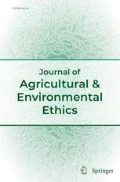Abstract
The traditional vision of the role science should play in policy making is of a two stage process of scientists first finding out the facts, and then policy makers making a decision about what to do about them. We argue that this two stage process is a fiction and that a distinction must be drawn between pure science and science in the service of public policy. When science is transferred into the policy realm, its claims to truth get undermined because we must abandon the open-ended nature of scientific inquiry. When we move from the sphere of science to the sphere of policy, we pick an arbitrary point in the open-ended scientific process, and ask our experts to give us the answer. The choice of the endpoint, however, must always be arbitrary and determined by non-scientific factors. Thus, the two stages in the model of first finding the facts, and then making a decision about what to do, cannot be clearly separated. The second stage clearly affects the first. This conclusion will have implications about existing scientific policy institutions. For example, we advocate that the environmental assessment process be radically overhauled, or perhaps even let go. It will be our position that ultimately a better model for the involvement of scientists in public policy debates is that of being participants in particular interest groups (“hired guns”), rather than as supposedly unbiased consultants to decision-makers.
Similar content being viewed by others
References
Agnolin, J. and K. Loverock (2002), “Scientists Criticize Endangered Species Bill.” Alternatives, 28.1 (Winter), p. 4
Bacon, F. (1942), ``New Atlantis,'' in G. S. Haight (ed.), Francis Bacon: Essays and New Atlantis, Roslyn, NY: Walter J. Black, Inc
Bacon, F. (1966), ``Thoughts and Conclusions,'' in B. Farrington (ed., trans.), The Philosophy of Francis Bacon, Chicago: University of Chicago Press
Burman, J. (2004), “Road Opposition Shelved.” Hamilton Spectator, July 29, A4
Busch L., 2000 The Eclipse of Morality: Science, Sate and Market. New York: Aldine de Gruyter
Canadian Council of Resource and Environment Ministers (1988), Environmental Assessment in Canada. Canadian Council of Resource and Environment Ministers (CCREM)
Carson R. 1962 Silent Spring. Boston: Houghton Mifflin
Chen, I. (2006), “Born to Run.” Discover, May, pp. 63–67
Collingridge D., C. Reeve 1986 Science Speaks to Power: The Role of Experts in Policy Making. London: Frances Pinter Publishers Ltd
Doern B., T. Reed 2000 Risky Business: Canada’s Changing Science-Based Policy and Regulatory Regime. Toronto: University of Toronto Press
Drengson, A. R. (1984), “The Sacred and the Limits of the Technological Fix.” Zygon, 19 (September), pp. 259–275
Ellul J. 1964 The Technological Society. New York: Random House
Environmental Assessment Act, RSO 1990, c. E.18
Estrin, D. and J. Swaigen (1993), Environment on Trial: A Guide to Environmental Law and Policy, 3rd edn. Emond Montgomery and Canadian Institute for Environmental Law and Policy
Ezrahi, Y. (1984), “Science and Utopia in Late 20th Century Pluralist Democracy,” in E. Mendelsohn and H. Nowotny (eds.), Nineteen Eighty-Four: Science between Utopia and Dystopia, Dordrecht: D. Reidel Publishing Company, pp. 273–290
Government of Canada (1980), “Environmental Assessment Panels: What They Are, What They Do.” Environmental Assessment Review. Minister of Supply and Services Canada. Cat. No. En 105–14/1980
Hajer M. A. 1995 The Politics of Environmental Discourse: Ecological Modernization and the Policy Process. Oxford: Clarendon Press
Jasonoff S. 2004. Essay Review of Science Truth and Democracy by Philip Kitcher: What Inquiring Minds Should Want to Know. Studies in History and Philosophy of Science 35:149–157
Kitcher P. 2001. Science, Truth, and Democracy. New York: Oxford University Press
Lee K. N. 1993 Compass and Gyroscope. Washington, D.C.: Island Press
Leiss W. 1994 The Domination of Nature. Montreal-Kingston: McGill-Queen’s University Press
Lewontin R. C. 1991 Biology as Ideology. Concord, Ontario: House of Anansi Press
McGinn R. E. 1991 Science, Technology and Society. Englewood Cliffs, N.J.: Prentice-Hall, Inc
Middendorf G., L. Busch 1997 Inquiry for the Public Good: Democratic Participation in Agricultural Research. Agriculture and Human Values 14:45–57
Mooney C. 2005 The Republican War on Science. New York: Basic Books
Morrison, S. (2004), “Bad Air May Harm Unborn.” Hamilton Spectator, May 14, A1, A9
Mumford L. 1964 Authoritarian and Democratic Technics. Technology and Culture 5:1–8
Nolan, D. (2004), “Tree Sitters Called ‚Real Heroes’.” Hamilton Spectator, August 6, 2004
Oreskes N. 2004 Science and Public Policy: What’s Proof Got to Do With It? Environmental Science and Policy 7:369–383
Pielke Jr. R. A. 2004 When scientists politicize science: making sense of controversy over The Skeptical Environmentalist. Environmental Science and Policy 7: 405–417
Salter L. 1988. Mandated Science: Science and Scientists in the Making of Standards. Dordrecht: Kluwer Academic Publishers
Sarewitz D. 1996 Frontiers of Illusion: Science, Technology and the Politics of Progress. Philadelphia: Temple University Press
Sarewitz D. 2004 How Science Makes Environmental Controversies Worse. Environmental Science and Policy 7:385–403
Sarewitz D. 2006 Liberating Science from Politics. American Scientist 94:104–106
Shrader-Frechette K. S. 1991 Risk and Rationality: Philosophical Foundations for Populist Reforms. Berkeley: University of California Press
Somers, C. M., B. E. McCarry, F. Malek, and J. S. Quinn (2004), “Reduction of Particulate Air Pollution Lowers the Risk of Heritable Mutations in Mice.” Science, (14 May), pp. 1008–1010
Statistics Canada, Environment Accounts and Statistics Division (2000), Expenditures on Environmental Protection by Industry and Activity (Catalogue no. 16F0006XIE). On-line database. Statistics Canada
Winner L. 1977 Autonomous Technology: Technics-Out-Of-Control as a Theme in Political Thought. Cambridge: MIT Press
World Commission on Environment and Development. 1987 Our Common Future. Oxford: Oxford University Press
Author information
Authors and Affiliations
Corresponding author
Rights and permissions
About this article
Cite this article
Haller, S.F., Gerrie, J. The Role of Science in Public Policy: Higher Reason, or Reason for Hire?. J Agric Environ Ethics 20, 139–165 (2007). https://doi.org/10.1007/s10806-006-9027-4
Accepted:
Published:
Issue Date:
DOI: https://doi.org/10.1007/s10806-006-9027-4



